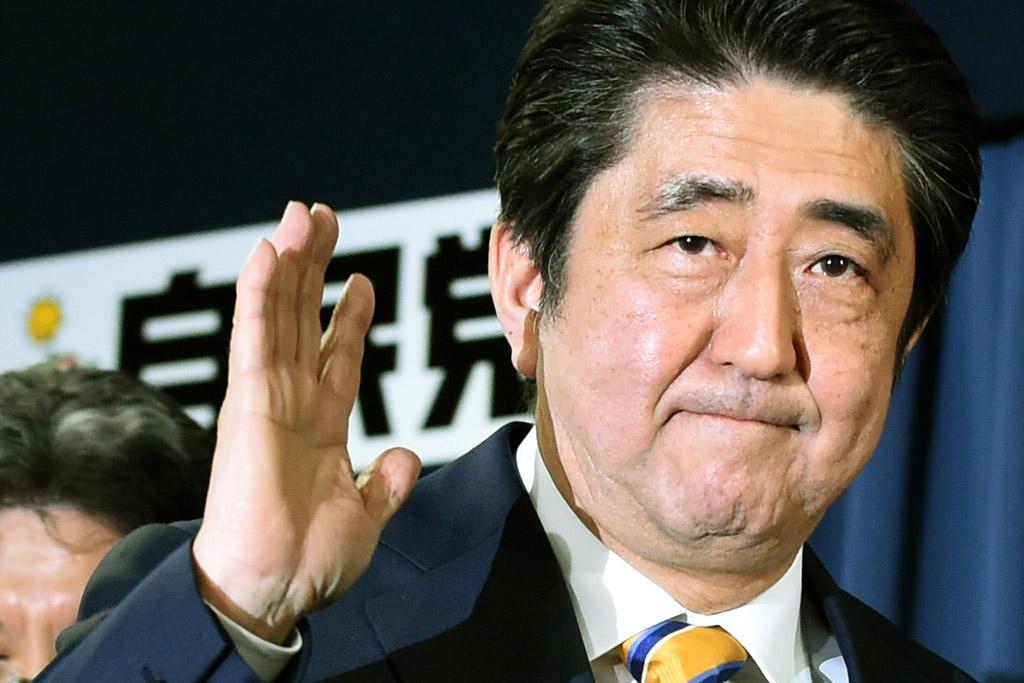PM Abe’s coalition cruises to big win in Japan election
Japanese Prime Minister and ruling Liberal Democratic Party (LDP) president Shinzo Abe waves at the party headquarters in Tokyo on Dec. 14, 2014.
TOKYO, Japan — Japanese Prime Minister Shinzo Abe's ruling coalition cruised to a big election win on Sunday, but feeble turnout could weaken his claim of a mandate for policies including reflationary steps to revive the economy.
Most media exit polls showed Abe's Liberal Democratic Party and its junior partner, the Komeito party, winning more than 317 seats in the 475-member lower house, enough to maintain its "super-majority" that smoothes parliamentary business.
But many voters, doubtful of both the premier's "Abenomics" strategy to end deflation and generate growth and the opposition's ability to do any better, stayed at home, putting turnout on track for a record low, interim figures showed.
Turnout had already hit a post-war low of 59.3 percent in the 2012 poll that returned Abe to power for a rare second term on pledges to reboot an economy plagued by deflation and an aging, shrinking population.
Hopes for Abe's "Three Arrows" of hyper-easy monetary policy, government spending and reforms such as deregulation were tarnished after the economy slipped into recession in the third quarter following an April sales tax rise.
Recent data suggest any rebound is fragile.
Abe decided last month to put off a second tax hike to 10 percent until April 2017, raising concerns about how Japan will curb its huge public debt, the worst among advanced nations.
"Given that we are taking all of these seats, between now and the delayed tax increase, we need to revive the economy and find a path to fiscal rebuilding," said LDP lawmaker Shinjiro Koizumi, the popular 33-year-old son of maverick former premier Junichiro Koizumi.
"That's the sole responsibility of the LDP now and there is no room for excuses. If you think about it in that way, even though we have won, there is no room here for celebrating."
Abe called the election early to strengthen his grip on power before tackling unpopular policies such as restarting nuclear reactors taken off-line after the 2011 Fukushima disaster and a security policy shift away from post-war pacifism.
The LDP-led coalition victory could ease Abe's path to re-election in a party leadership race next September, boosting the likelihood, though by no means guaranteeing, he stays in power through 2018 and becomes one of Japan's rare long-term leaders.
"Third arrow doubts"
The main opposition Democratic Party of Japan (DPJ) was unable to gain much traction, largely due to voters' memories of a 2009-2012 rule plagued by policy flip-flops, infighting and three premiers in three years.
Exit polls showed the DPJ gaining from the 62 seats it held before the vote, but falling well short of the 100 seats it had unofficially targeted.
Aside from local elections in April, Abe's coalition will probably not need to face voters until a 2016 election for the upper house, where the LDP and the Komeito party now hold a majority.
Doubts, however, persist over whether Abe will knuckle down on his "third arrow" of reforms in politically sensitive areas such as labor market deregulation that would make it easier to shift workers to growth areas but also to lay off employees, and reform of the highly protected farm sector.
Hidenori Suezawa, fiscal analyst at SMBC Nikko Securities, said share prices would rise and the yen weaken when trade opens on Monday in response to the election results. But he added that doubts remained about Abe's ability to tackle structural reform.
"Whether the Abe government is able to carry things out will be closely watched and is likely to prove a key to the economic and fiscal policies going into next year," he said.
Progress has been limited so far, critics say, partly due to opposition from members of Abe's own party.
"My expectation is that we will get pretty much more of the same," said Columbia University professor Gerry Curtis. "I don't expect any big, bold moves."
Some experts believe Abe could also turn attention away from the economy to his conservative agenda that includes laying the groundwork to revise the post-war, pacifist constitution and recasting Japan's wartime past with a less apologetic tone.
That agenda raises hackles in China and South Korea, where bitter memories of Japan's past militarism run deep.
The LDP had 295 seats and Komeito 31 in the 480-member lower house when it was dissolved for the election. Five seats were cut through electoral reform.
(Additional reporting by Kiyoshi Takenaka, Elaine Lies and Kevin Krolicki; Editing by Dean Yates and Mike Collett-White)
We want to hear your feedback so we can keep improving our website, theworld.org. Please fill out this quick survey and let us know your thoughts (your answers will be anonymous). Thanks for your time!
